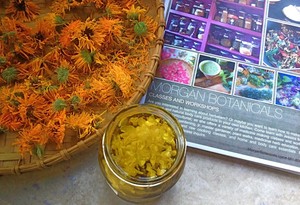14 Jun Sun 2009
Beneficial Herbs for Menopause

"There is no more creative force in the world than the menopausal woman with zest"
-Margaret Mead
There are many wonderful herbs to help women comfortably transition into their menopausal years. Both Western and Chinese herbs are available which mimic the hormonal effects of both estrogen and progesterone within the body. These herbs "trick" the body into thinking it's getting the hormones. If you suffer from any of the associated symptoms of menopause such as hot flashes, lowered libido, memory issues, vaginal dryness, palpitations, night sweats, weight gain, depression and irritability- there are great herbs out there.
Here is a list of some easily accessible herbs.
Black cohosh- beneficial for hot flashes, insomnia, irritability, vaginal dryness, prolapsed uterus and bladder, phytoestogen effects.
Motherwort- beneficial for palpitations, hot flashes, sloughing of the lining, phytoestogen effects.
False unicorn- beneficial for vaginal and uterine atrophy, and menstral irregularities.
Wild yam- beneficial for muscle and menstrual cramps, prevents bone loss, regulates PMS and depression.
Vitex- benifical for water retention, depression, uterine fibroids, breast lumps, menstral flooding, and skin breakouts.
Dang gui- nourishes and build blood, hot flashes, irregular cycle, and vaginal dryness.
Nettles -helps with water retention, weight gain, strengthens bones (high in Calcium)
Oatstraw- relieves tension, nervousness, insomnia, and builds bones (high in Calcium)
Black haw- beneficial for menstrual cramps and pain, flooding or excessive bleeding.
Kava kava- beneficial for tension, anxiety, and insomnia.
Ginseng- beneficial for tiredness, poor memory and concentration, anxiety, insomnia, and low libido.
Asparagus root- helps strengthens female hormones
Solomon's seal- builds reproduction secretions and aids vaginal dryness.
Epimedium- helps with hot flashes, night sweats, headaches, dizziness, and light headedness.
Along with taking herbs it is important maintain certain dietary guidelines to help alleviate menopause symptoms naturally. I like to suggest proper protein intake, whole grains and legumes, consuming lots of fresh locally grown vegetables and fruits as well as other phytoestrogenic and calcium rich food and herbs.
Are you looking for an all natural treatment for menopause? Look for my Women's Health Herbal Menopause Tea and Flash Calm Herbal Menopause Tea here in my Local Harvest Store.
As always, please email any questions to herbalist@morganbotanicals.com.
Follow me on Twitter - MorganBotanical
Copyright 2009. All rights reserved. Jessica Morgan, M. H., Morgan Botanicals.
Disclaimer - The information provided in this article is for informational purposes only and is not intended as a substitute for advice from your physician or other health care professional. You should not use the information in this article for self-diagnosis or to replace any prescriptive medication. You should consult with a health care professional before starting any diet, exercise or supplementation program, before taking any medication, or if you have or suspect you might have a health problem, suffer from allergies, are pregnant or nursing.
Jessica Morgan, M.H.


Great list!! I had only been aware of cohosh and a few others. I want to pass along this article that explains HOW herbs work in the body to reduce flashing and other meno symptoms (the fancy term for using herbs is "phytotherapy" I never knew this!).
Here's the link:
<a href="http://www.womentowomen.com/menopause/phytotherapy.aspx">Phytotherapy — the key to hormonal balance?</a>
I'm thrilled you enjoyed this article.
It's important that women are aware that there is a better method to moving through this stage in life. When my mother started experiencing menopausal symptoms her doctors were quick to offer her hormone injections which scared me. By incorporating some natural remedies into her life style she easily and happily transitioned.
Take care,
Jessica
Hello. I am going through what I suppose is perimenopause, at age 54. My periods are becoming few and far between. For the last 7 years, my hair has been falling out badly. I was under a great amount of stress at the time that it first started falling out, and the stress has been removed, but my hair has not grown back in. It grows long, but I still have a big thin area on the crown and the sides. What herbs would help me? Could it be from a hormonal imbalance?
A hormonal imbalance is the most common reason for hair loss and/or thinning hair in menopausal women. Estrogen is the hormone that keeps hair growing. A more low-key approach is to make a few simple changes in your diet. Try eating more foods that contain estrogen, including alfalfa, rice, yams, potatoes, wheat, and some soy products. For most women, the hair growth normalizes once their hormones have stabilized. And of course, try to live as stress free as possible.
Take care,
Jessica Morgan
Hi,
Just wanted to mention another herb that provides amazing relief of hot flashes and sweats--Siberian rhubarb root extract. Normally rhubarb root has a laxative effect. Siberian rhubarb root has less of the laxative causing agents. The extract has none (no laxative effect). It has been shown to reduce hot flashes and night sweats by 72% in just 12 weeks, taking a single 4 gram dose daily. Women who were followed for two years and underwent extensive pre- and post- testing (lab studies, endometrial biopsies) showed no negative side effects from taking the extract for 24 months.